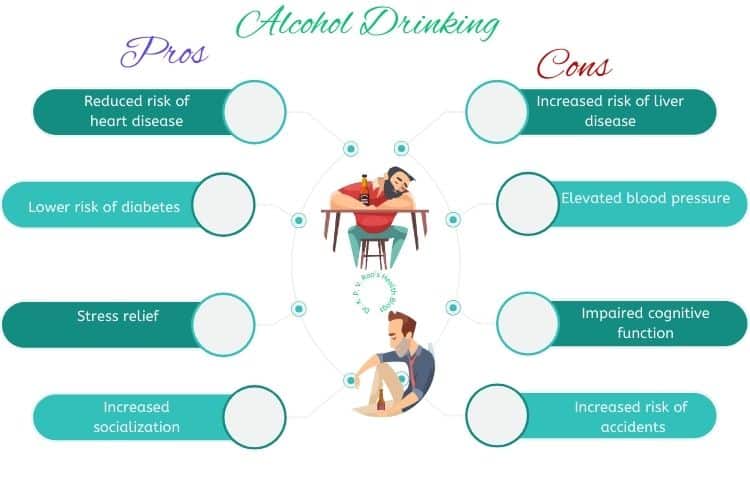
Introduction
Hello, friends and knowledge-seekers! Today, we will learn and dig into the world of alcohol drinking and uncover its shocking impact on our overall health and well-being, if not had in moderation. We will also discuss the 8 reasons to moderate alcohol intake, if you like drinking it, so as to lead a good healthy life.
In my medical practice, I have often encountered many people bringing in their loved ones with some or the other ill-effects of consuming this beverage.
If you’ve ever wondered about the true effects of alcohol on your mind, body, and spirit, then you’ve come to the right place. Prepare to be informed, enlightened, and perhaps even moved as we unravel the complex relationship between alcohol and your health.
Here’s a case study to begin with [ the names used in case study is not real(used to protect privacy of the patient), even though this is a real story]-
A Case study
I came across Frank D’Costa early in my practice. He had a small grocery store in the area where I was practicing. One fine day I got a call saying Frank was behaving oddly, not having food and not able to stand up on his own. I reached his home to find him sitting on his bed, staring into space. I went and stood in front of him.
“Who is it?” he asked.
” Hi Frank” I said.
“Oh, hi doctor, I can’t see you.”
“Why, what’s happened?” I asked him. Then his wife spoke. “Frank has been drinking alcohol every day for the past one month” she told me.
” Oh, which alcohol he drinks?” I queried. “Local country-made ones most of the times.” she quipped in. Now, let’s get back to knowing what Frank was suffering from. Frank was having Wernicke’s-Korsakoff Syndrome, an illness brought on by excessive alcohol consumption.
Locally manufactured alcohol contains methanol as a contamination which possibly caused his loss of vision. Other than that, the spirits he consumed affected his brain so much that it made his leg muscles weak, making him dependent upon others in the family.
Frank suffered from thiamine deficiency, also known as Vitamin B1, caused by poor nourishment and his eating habits. His health deteriorated further as the days went by and he passed away a few months later, in spite of all my efforts to bring back his health.
In this thought-provoking blog post, I’ll take you through the various types of alcohol, shed light on the consequences of overconsumption, and address the major health concerns associated with this ubiquitous substance.
So, grab a cup of tea (or your preferred non-alcoholic beverage) and join me on this enlightening journey towards a better understanding of the surprising truth behind alcohol’s impact on your health and well-being. So, let’s get started!
What exactly is Alcohol?
What exactly is alcohol? It is a psychoactive substance that is prevalent in various alcoholic beverages. It is derived through the fermentation of sugars by yeast and can have intoxicating effects when consumed.
Alcohol, a common beverage consumed globally, has the potential to sabotage our health and well-being. It is a widely consumed substance that can significantly impact our health and well-being.
So, understanding what alcohol is and how it affects our health is crucial for everyone, especially health-conscious people.
The Pros and Cons of Drinking Alcohol
This picture below shows the good and bad effects of alcohol consumption in a nutshell.

Let us now study in detail the pros and cons of this beverage. While some may argue that moderate alcohol consumption can have health benefits, it is important to note that excessive drinking can have serious negative consequences.
Here are some potential benefits of moderate alcohol consumption:
- Reduced risk of heart disease: Studies have shown that moderate alcohol consumption can help reduce the risk of heart disease by increasing levels of “good” cholesterol in the body.
- Increased socialization: For many people, drinking alcohol can be a way to socialize and connect with others in a relaxed and enjoyable setting.
- Lower risk of diabetes: Some research suggests that moderate alcohol consumption may help reduce the risk of developing type 2 diabetes.
- Stress relief: Drinking alcohol can have a calming effect on the body, which can help reduce stress levels in some individuals.
Bad effects of Overconsumption of alcohol on Health- 8 reasons to moderate your alcohol intake
As compared to benefits of drinking, alcohol consumption can have a multitude of negative effects on our health, both in the short term and long term.
These are the eight reasons why you should moderate your alcohol intake:
- Increased risk of liver disease, including cirrhosis and liver cancer.
- Elevated blood pressure and greater susceptibility to cardiovascular problems.
- Weakened immune system, making individuals more susceptible to infections and diseases.
- Worsening diabetes in a diabetic under treatment leading to complications like diabetic foot disease and diabetic neuropathy.
- Impaired cognitive function and increased risk of mental health disorders like dementia [as described in the Case Study].
- Higher likelihood of developing various types of cancer, including breast, colorectal, and oral cancer.
- Negative impact on the digestive system, leading to gastritis, ulcers, and other gastrointestinal issues.
- Increased risk of accidents, injuries, and violence due to impaired coordination and judgment.
Understanding the different types of alcohol and their concentrations
Alcohol consumption can have a profound impact on our health and well-being, often in ways that are startling. It is crucial to be aware of the limits of alcohol consumption in order to maintain a healthy lifestyle.
This report sheds light on different types of alcohol, and delves into its impact on our health, and emphasizes the regional relevance of this issue. Concentration is also important in a beverage containing alcohol and is indicated as ABV (alcohol by volume)
Here are the different types of alcohol, their concentrations and limits of consumption:
Alcohol Type Concentration Consumption (Men) Consumption (Women)
Beer 4-6% ABV 2-3 servings/day 1-2 servings/day
Wine 12-14% ABV 1-2 glasses/day 1 glass/day
Spirits * 40-50% ABV 1-2 shots/day 1 shot/day
*Spirits include malted and distilled liqours like whiskey, brandy, rum and vodka, etc.
What is The Safe Limit of different types of Alcohol Consumption?
The safe limit of alcohol consumption varies depending on the type of alcohol. As a general guideline:
- For wine, the safe limit is generally no more than 1 to 2 glasses per day for men and no more than 1 glass per day for women.
- For beer, the safe limit is typically considered to be no more than 1 to 2 standard drinks per day for men and no more than 1 standard drink per day for women.
- For spirits, the safe limit is often recommended as no more than 1 to 2 drinks per day for both men and women.
It’s important to note that these are general recommendations and individual tolerances may vary. Additionally, it is always advisable to consult with a healthcare professional for personalized advice regarding alcohol consumption.
To assist in understanding the different types of alcohols and their recommended consumption levels in men and women, here is a simple table-
Men:
| Type of Alcohol | Normal Limit (ml) |
|---|---|
| Beer | 355 |
| Wine | 148 |
| Spirits | 44 |
Women:
| Type of Alcohol | Normal Limit (ml) |
|---|---|
| Beer | 355 |
| Wine | 148 |
| Spirits | 29 |
It is important to note that these recommendations may vary based on individual factors and health conditions.
Monitoring alcohol intake and staying within the recommended limits can significantly contribute to maintaining our health and well-being.
How to Practice Moderation of Alcohol Consumption
It is important to note that individual reactions to alcohol can vary widely and that excessive drinking can have serious negative health consequences. In my opinion, it is always a good idea to drink in moderation and to be aware of your own limits.
The recommended safe limit for alcohol consumption [see above] varies depending on factors such as gender, age, and overall health.
It is generally suggested that men should limit their alcohol intake to no more than two standard drinks per day, while women should consume no more than one standard drink per day.
It is important to note that excessive alcohol consumption can have negative health effects and can increase the risk of various health conditions. It is always best to consult with a healthcare professional for personalized advice regarding alcohol consumption.
Support Groups to Help Overcome Alcohol Addiction
There are many support groups out there to help overcome alcohol addoction. These support groups aim to help individuals overcome their addiction by providing a supportive community and resources.
These groups offer a platform for individuals by holding weekly or monthly group meetings where they can share their experiences, listen to others, and receive guidance from those who have successfully recovered from alcohol addiction.
Some well-known alcohol addiction support groups include-
- Alcoholics Anonymous (AA),
- SMART Recovery, and
- Women for Sobriety (WFS).
These groups typically follow a structured program that includes regular meetings, steps or guidelines to recovery, and a focus on personal accountability and self-help.
FAQ on Alcohol consumption
There are many that remain unanswered of issues to drinking alcohol. Here are some of the frequently asked questions by my patients and my answers to them:
How does excessive alcohol consumption impact your health and well-being?
Excessive alcohol consumption can have detrimental effects on your health and well-being.
It can lead to various health issues such as liver damage, increased risk of cancer, cardiovascular problems, and mental health disorders.
Additionally, excessive alcohol consumption can impair cognitive function, hinder productivity, and negatively impact relationships and overall quality of life.
What are the recommended guidelines for alcohol consumption?
The recommended guidelines for alcohol consumption vary depending on factors such as age, gender, and overall health.
In general, moderate alcohol consumption* is advised, which means up to one drink per day for women and up to two drinks per day for men. However, it is essential to consult with a healthcare professional to determine what is appropriate for your specific circumstances.
*I have already mentioned it above.
How can excessive alcohol consumption be harmful to your long-term health?
Excessive alcohol consumption can significantly harm your long-term health.
It can increase the risk of developing chronic conditions such as liver disease, pancreatitis, and certain types of cancer.
Additionally, it can weaken the immune system, disrupt sleep patterns, and contribute to nutritional deficiencies.
Long-term alcohol misuse can also lead to addiction and dependency, further exacerbating health and well-being issues.
What will happen if you stop drinking alcohol abruptly?
Abruptly stopping alcohol consumption can lead to withdrawal symptoms such as tremors, anxiety, sweating, nausea, and in severe cases, seizures or delirium tremens. It is recommended to seek your doctor or healthcare professional’s guidance for a safe and supervised approach to stopping alcohol consumption. I advise a gradual withdrawal to prevent getting withdrawal symptoms.
Conclusion
In conclusion, I would say that personally I am not averse to drinking alcohol if it is done in moderation. I myself have a drink or two of vodka per month, keeping it up to the recommended intake of 45 ml.
Alcohol can pose significant threats to our health and overall well-being. Understanding the nature of alcohol, its impact on our health, and the regional relevance of this issue is essential for individuals, particularly health enthusiasts.
By raising awareness and implementing targeted interventions, we can work towards minimizing the detrimental effects of this good yet not so good beverage and promoting healthier lifestyles.
Suggested reading:
- Alcohol and Cancer Risk
- Beyond the Bottle by Gael Maclean on Medium
- How much alcohol do you drink by Robert Roy Britt on Medium
Final Words
I hope that you have found this blog post useful. If yes, do share it with your friends and family members using the social media channels at the bottom of this blog. Or you can just click to tweet here-
8 reasons to moderate alcohol intake and live a better life Share on XMy next article will be on a very common and irritating condition that we face regularly in our day-to-day busy life- Cervical Spondylitis. Till then-
Adios!




